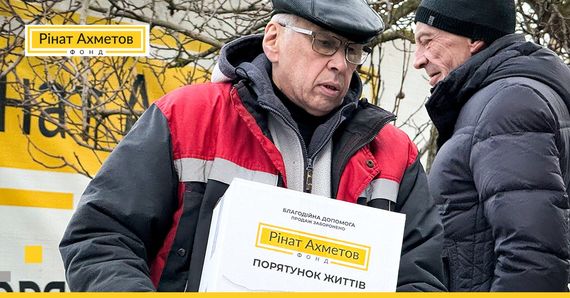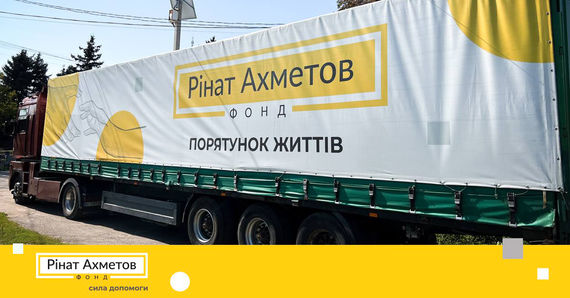Oleksandr Vyshniakov: Rinat Akhmetov Humanitarian Center is a team united to give a helping hand to those who remained in the war

For almost 1.5 years the Humanitarian Center has been helping Donbas civilians to cope with the disaster that came down on them. Helping those who stayed in the epicentre of hostilities to survive. And supporting those who settled in the peaceful territory of the region in their new conditions. Oleksandr Vyshniakov, the General Director of Rinat Akhmetov Humanitarian Center, told about the Center's team and ability to hear people's needs, new challenges and solutions.
Oleksandr, for more than a year you were at the head of the largest Center's direction called "Humanitarian Aid". How did the volumes of provided assistance change during this period?
In late August, 2014, when the Humanitarian Center sent its first convoy to Donbas, our norm was the issuance of 6,000 food packages a day. The need was at this level back then. To do all this we had to deliver food products at Donbas Arena, unload them and form food packages. And all this was accompanied by continuing shelling outside the gate of Donbas Arena. Back at that time we could unload one truck at a time, now we can do eight. In addition to the unloading it was necessary to organize food storage and load the vehicles that will deliver food packages to the issuing points. The most important and the major goal was learning how to form a conveyor for collecting packages and how to store them. It was quite difficult to do it at the stadium, but thanks to the volunteers of Shakhtar Football Club and SCM enterprises we built a unique system, which surprised a lot of representatives of international humanitarian missions. Over the course of time our norms of forming and issuance of humanitarian aid were growing and made 10, 12, 15 thousand survival kits a day.
What difficulties exist in the Humanitarian Center's operation today?
We became the closest to people's trouble, their requirement in food and general understanding of what is happening in Donbas. And those difficulties due to imperfect rules and legislation, as well as poor communication between the state authorities, never stopped us. In all the cases Rinat Akhmetov set the same goal: find the way to deliver humanitarian aid to people.
The number of difficulties and constraints in the Humanitarian Center's operation has not reduced, they are just different. The dynamics in providing assistance that we started with forced us to react through amendments to the laws. We were not always heard, but we acted the way circumstances warranted. Our requests were not always responded or came very late. Moving ahead of this system we realized that we were the first to detect and overcome the problems.
Today there is an urgent issue of bringing humanitarian medications to non-government-controlled areas. We sent six inquiry letters, asking to define the rules of import and licensing. And it's all happening during the time, when we know that thousands people there need essential pharmaceuticals. First of all, those medications that are available in the local pharmacies are often not good for chronic patients, second, they are expensive and not everyone can afford them. We understand the problem scale through the number of calls coming on the Center's hotline.
One of the challenges that the Humanitarian Center faced lately, was the difficult situation at the food market and difficulties with purchasing products for survival kits. How is the Center working in these conditions?
The prices for basic food on the market are rapidly growing, so domestic suppliers are holding their products and expecting to get the maximum profit. But the Humanitarian Center cannot suspend the dispatch and issuance of humanitarian aid to hundreds of thousands people, that's why we are looking for other possibilities to purchase food in advance. It's not a standard model, because Rinat Akhmetov Humanitarian Center is a non-commercial organization. But it is forced to be in a close connection with commercial market, which has different rules and laws, and the work would be impossible without their observance. However, it’s a different matter when the agreements are contrary to the principles of our work. In my opinion, such values as partnership, readiness to help and understanding the trouble that people got into, are the same everywhere. Agreements must be respected both in business and charity. Therefore, if any supplier from our pool is ready to break an agreement in order to get profit, we stop any cooperation with him. Many of our suppliers are socially responsible companies, and we are grateful for their understanding of our goals.
During the last few weeks the checkpoints for crossing the contact line gather long, multi-kilometre queues. What is the situation with humanitarian aid delivery to Donbas?
When delivering humanitarian aid, first of all we are thinking of people: those whom we are taking it to and those who do this job. We cannot paralyse the work of a checkpoint. We deliver food to the first group, and the second group has to stand in lines for us and stay overnight in the fields to make our convoy pass. In this situation we'd rather stay there overnight, and it will be easier for people to pass through the checkpoints.
We keep monitoring the situation with Kurakhove checkpoint. Its opening for humanitarian loads will help us reduce the time of convoy movement by more than two hours. For us these two hours reduce the total delivery time from 3-4 days to 2 days a week, because we can deliver humanitarian aid to the logistic warehouse at Donbas Arena within one light day. We have all the processes verified and all documents ready for every convoy to pass. As a rule, the customs and fiscal services are doing their job effectively. It is important for us to get to Donbas Arena during the daylight. In December we already plan to send the first convoys through Kurakhove checkpoint without our trucks staying there overnight.
You developed a single schedule for convoys of Rinat Akhmetov Humanitarian Center and international humanitarian missions to cross the contact line. How was it developed and how effective is it now?
Rinat Akhmetov is setting a goal for us: to be always open, which includes communications with international missions. We promptly exchange information on the situation to ensure that all assistance, provided to Donbas today, has been effective. For this purpose we create joint committees that include representatives of the Center and other humanitarian missions. We all have a common goal, which is helping people, but the possibilities of its implementation and the approaches are different. At the very beginning of our operation the Humanitarian Center adopted the experience of international missions, but when we faced the scale of tragedy, we realized that we needed to go our own way, and in some issues we have already become an example.
I remember the spring of 2015, at that time we delivered humanitarian aid for more than six months. When escorting our convoy then, I first saw the trucks of the International Committee of the Red Cross with humanitarian aid for Donbas, they were staying at Kurakhove checkpoint for a few days. The border service didn't let them pass due to the lack of prepared supporting documents. It turned out that they were all alone with this whole system. At that time we decided to help and share our experience. Our group of convoy escorts gathered the drivers and explained what documents they needed.
That moment marked the start of our cooperation with representatives of humanitarian missions. When they opened a checkpoint near Volnovakha in summer, we came up with a need to create a single schedule of customs clearance, which we are following up to this day. This schedule was handed to the customs and fiscal services, and we have committed to coordinate the joint actions. Thanks to this synergy, each of us can systematically deliver humanitarian aid and not hinder each other.
Recently the Humanitarian Center expressed support for UNICEF in breastfeeding promotion and changed the scheme of children package issuance, so that nursing mothers could get all the necessary food products and secure healthy nutrition for their babies. Why is it so important for the Humanitarian Center to change the approaches to rendering assistance?
The quality of newborns’ nutrition directly affects their development is the future. It is proved by multiple researches. We could not stay aside, that's why we supported UNICEF initiative and changed the composition of children packages. Without paying special attention to the healthy nutrition of babies and nursing mothers we can face a bigger problem later, as time passes. Today it is important to have UNICEF experience supported at the state level.
The Center's team is always aimed at improving our aid. This is a personal motivation of our employees. We changed our approach to issuance of children packages and their composition. But we do not limit ourselves to the only logic of receipt and selection of products. It is important for us to become experts in this issue, to have a better understanding of people's needs and improve our assistance. All the hotline operators and 85 volunteers at the issuing points were trained on breastfeeding and consulting young mothers now. We created a real complete project that could benefit Donbas residents even in the postwar period.
Helping children is one of the main goals that was set by Rinat Akhmetov to the Humanitarian Center. Food and medical assistance projects are launched and working efficiently. Children, who were traumatized by military conflict, have psychologists working with them. It is important for us to provide the maximum assistance, doing it with love and complete dipping into their problems. Even the issuing point at Donbas Arena, which used to issue only children packages for a long time, has a special atmosphere, because children are like angels, supporting adults during the war by their sincerity. And we see that we work for good reason.
What are the goals of the Humanitarian Center for the coming months? What directions will be paid special attention?
We keep on implementing the goal set by Rinat Akhmetov: help Donbas civilians who need it the most. In December we are planning to increase the intensity of humanitarian aid delivery to non-government-controlled areas of Donetsk and Luhansk regions, to provide a reserve of food packages in logistics centres and all issuing points in the first weeks of 2016. This is due to the possible congestion at the checkpoints on the threshold of New Year holidays. For this purpose we are planning to purchase 11,000 tons of food products to form more than 600,000 survival kits. In addition to humanitarian food aid, in 2016 the mobile teams of the Humanitarian Center's volunteers will be delivering household chemicals to the most remote villages, as there is an urgent need for hygiene products there.
Rinat Akhmetov Humanitarian Center will continue helping Donbas residents. We understand that people's needs will change, depending on the situation, and we are ready to respond to these changes.
Based on the volumes of aid supplied to Donbas, the Humanitarian Center can be considered the largest and the most effective organization. What do you think helps to achieve these results?
Effectiveness can be understood in different ways. In my opinion it means the ability of doing the necessary things on time. And this is how the Humanitarian Center works. Rinat Akhmetov is the only one who assists consistently, with an obligation of subsequent delivery. Probably, we wouldn't even be able to find the words to explain why we stopped helping. He cares about the lives of people who stayed there and need help. A war will always have its children. And now these are not only elderly people of 90 years old, but also our young compatriots, who became the victims of this scary situation.
The main factor, explaining how we achieved this result, is the Humanitarian Center's team. No words are enough to express the gratitude to all the volunteers, who are staying in non-government-controlled areas and villages on the contact line that observe regular shelling, and helping people there. And they are doing it without thinking of risk for their own lives. We are also grateful to our partners, both in non-government-controlled areas and peaceful territories of Donbas, who provide rooms and premises for our issuing points, taking care of local civilians.
All these people are united by one goal: give a helping hand to those who live in war. Because most of our employees and volunteers come from Donbas and they understand and feel the pain about everything that is happening.



